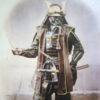Does superstition play a part in Bushido? In a sense, any tradition is a superstition. Does any belief survive? Because that is the literal meaning of superstition.
Does any form of Bushido persist in modern Japanese society or is it all historical? Actually, yes. It doesn’t exist unmodified, but it is how the “do” disciplines got started. To preserve the ways, practices and the benefits if used only in a civic fashion like judo, aikido and tai kwon do in Korea.
Does it translate in any way to how the Japanese conduct business regarding honourable behaviour, etc? It does indeed. It was a body of values that very much shaped their culture like chivalry shaped the west. So they seek to use the old teachings to cultivate similar dedication. “Spirit.”
A Samurai had to be trained in etiquette. A farmer could ignore it as it was just seen that they needed to do their job, respect the law, and that was about it. But a Samurai without courtesy was just an idiot. Potentially provoking armed conflict and harm to everyone so it was not acceptable. You could be challenged even by a member of your own house, and with the Daimyos acceptance the duel could be to the death for failure to observe etiquette.
Making jokes about someone’s mother could be suicide? Yes, very literally. This is why they said the family name first, and if you behaved shamefully it was seen as you came from that house. You were the product of their teaching so if you were dishonourable perhaps the whole house couldn’t be trusted. This could have your wife unable to buy and sell, and your children go hungry and be rejected for training. This is why they had the tradition of Sepuku. It was considered the proper way to show deep remorse and to excuse the other members of your family, because death is more acceptable than failure.
Sepuku? Hara-kiri. Death by self disembowelment to atone.
Was there a way to get your slate wiped clean or was the dishonour there forever? If the shameful one performed hara-kiri no other member of the family would be held responsible. But this was based on the judgment of your Lord. If the Daimyo said you were not to perform hara-kiri, then defying that would gain nothing, but by the Lords decree your family would not be shunned also. Often a Samurai would beg for hara-kiri.
Would the shunning still stand? No. If the Daimyo said you would not hara-kiri, then the order would be restored and your family would have to be honoured.
Why would they beg for hiri-kiri then? Sense of shame and the memory of their failure would still exist. So subtle social jabs would still happen. Humiliated to death and hara-kiri would be considered honourable release from that. You could even ask for one of those who had spoken ill of you to be involved, because you needed an attendant to end your suffering when the Daimyo said it was enough.
No wonder even today there are people who would rather die than be wrong? Perhaps a past life. The Samurai did believe in reincarnation.
Is it fair to say they had little disorder? They had very little disorder during their feudal era. This is part of why the “modern” era seems like such a culture shock for them.
Hasn’t suicide been a common practice for many businessmen in Europe during the 19th century who faced a bankruptcy, so it’s not all cultural maybe? It isn’t all cultural, no. They get sort of lost. Even their upbringing, their grandparents, etc, doesn’t really equip them well for the modern and very much non-meditative world. It does give them a sense of right and wrong which makes them see much of the modern world as all wrong. It must be a very demoralizing experience for them.
Basically it was saying, “I have completely blown this life due to one error.” I can see how there would be order, but I see how it could be abused. It can be and is. So are they psychotic because they embrace those values? I would say no.
So many see killing yourself as selfish and then some see it as being honourable. Even in modern Japan they see suicide as selfish, because they still favour a “communal” style of life by comparison to westerners. So committing suicide now is like saying, “Family, I will not help you.” “Family, I will give you trauma instead.” So even their culture does not glorify suicide. Their paradigm is just different. They put blood type on the level of astrological sign if not higher, and if I have my type correct, their dominate type as a culture is A.
The hara-kiri “ritual” suicide seems to be some kind of a feature of a patriarchal system. The higher the position of the man among his family, the more fragile it becomes and the more unable you are to repair damage? They were a patriarchal society. They are no longer officially, but as a society emotionally they still are. So is Western society and whether this is wise or not might be fuzzy, but it is still basically true.
Your thoughts are welcome. Be well friends.
Travis Saunders
Dragon Intuitive
~science,mysticism,spirituality~



Leave a Reply to Bill Cancel reply